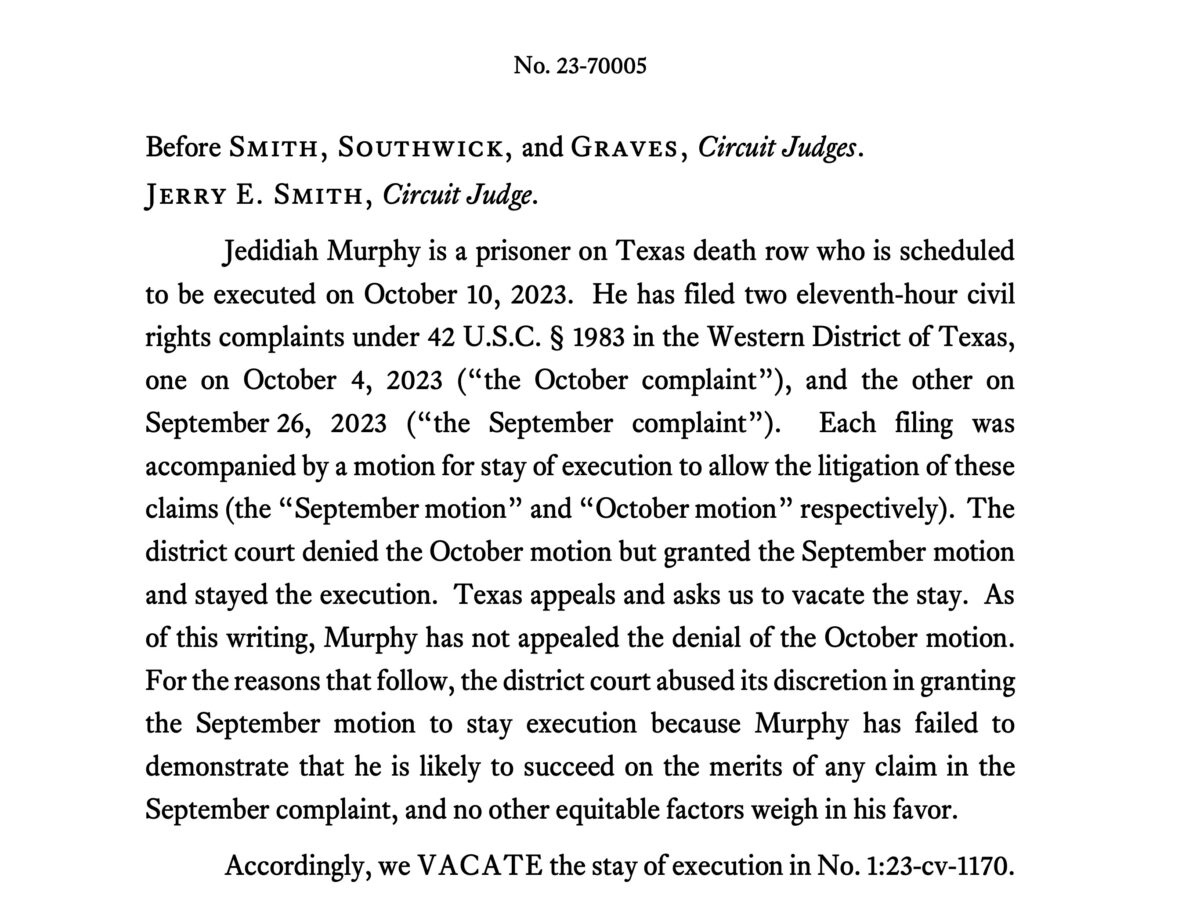Federal Judge Who Melted Down in Texas Redistricting Dissent Once Wrote Fake Majority Opinion Bashed as ‘Barbaric Fanfiction’

(L) Public domain photo; (R) Photo by Bobak Ha’Eri via Creative Commons license (CC-By-SA-3.0).
A federal judge who issued a scathing dissent in a Texas redistricting case that attacked the majority for “outrageous” judicial conduct and “judicial activism” is no stranger to dramatic judicial antics, including crafting a fake majority opinion for one of his dissents.
Judge Jerry E. Smith with the U.S. District Court of Appeals for the Fifth Circuit is a 79-year-old Texas native who received both his undergraduate and law degrees from Yale University. He was nominated to the federal bench by President Ronald Reagan in 1987.
Smith was the dissenting opinion in a 2-1 decision issued on Tuesday in which the majority blocked Texas’s efforts to redraw its congressional maps, finding that there was “substantial evidence” the new district lines were “racially gerrymandered,” and ordering the state to return to its 2021 map.
Normally, states draw their electoral maps every decade after new Census data is released, but in the wake of President Donald Trump’s reelection and the critically important 2026 midterms, he urged GOP-majority states to redraw their district lines early in order to give Republicans an advantage.
The 160-page opinion was written by Judge Jeffrey V. Brown with the U.S. District Court for the Western District of Texas, a Trump appointee, and joined by Senior U.S. District Judge David C. Guaderrama, an Obama appointee. At the time the opinion was released on Tuesday, Smith’s dissent was noted, but his dissenting opinion was not included.
In the majority ruling, Brown found multiple reasons that the plaintiffs were “likely to prove at trial that Texas racially gerrymandered the 2025 Map,” specifically citing a letter from the Department of Justice and multiple public comments by Texas Gov. Greg Abbott, and ruled to grant a preliminary injunction ordering the state to revert to the 2021 maps.
Brown’s opinion also expressly rejected Texas’s argument that going back to the 2021 map would cause a “significant disruption,” pointing out that the filing deadline had not yet passed and the court ruling was issued “well before” that Dec. 8 deadline.
“Simply put, the 2026 congressional election is not underway,” wrote Brown, adding that any “disruption” the state claimed “is attributable to the Legislature, not the Court,” and commented that the case had been handled expeditiously, with the plaintiffs’ lawsuit being swiftly filed and the court and parties having worked “diligently” to get the motions filed and the preliminary injunction hearing scheduled, held, and a ruling issued — which had been a “Herculean task,” but the three-judge panel “has done everything in its power to rule as quickly as possible” and “sufficient time remains for an injunction to take effect.”
Smith’s 104-page dissent begins by quoting an iconic Bette Davis film character (Margo Channing, “Fasten your seatbelts. It’s going to be a bumpy night!” from 1950’s All About Eve) then dives straight into an attack on Brown’s character, accusing him of “pernicious judicial misbehavior,” the “most outrageous conduct by a judge that I have ever encountered in a case in which I have been involved,” and “the most blatant exercise of judicial activism that I have ever witnessed.”
Chief among Smith’s complaints is that Brown “issued a 160-page opinion without giving me any reasonable opportunity to respond,” writing that Brown and Guaderrama voted after the evidentiary hearing concluded on Oct. 10 to issue the preliminary injunction, sending him several outlines and draft opinions over the next few weeks but not the final version until a few minutes before it was published in the court docket, having informed him a few days prior that they “do not believe we can wait for a dissenting opinion before we rule” due to the time pressures of the pending election cycle.
“This outrage speaks for itself,” Smith wrote, declaring that “[a]ny pretense of judicial restraint, good faith, or trust by these two judges is gone,” accusing the majority of being “unfairly eager to issue the opinion sans my dissent,” and complaining that publishing the majority opinion without waiting for his dissent meant that it was in “a separate, non-consecutive docket entry.”
Smith’s dissent also attacks the majority for not agreeing with him that the Texas redistricting had a partisan political motive, shrugging off the multiple citations of the DOJ letter and public comments by Abbott and other Texas state officials regarding a racial intent and impact.
There are also several pages near the beginning of the opinion of Smith attacking George Soros because his foundation donated funds to projects led by the plaintiffs’ attorneys and one of the plaintiffs’ expert witnesses. It should be noted that Soros is not accused of any crime or unethical activity here. This section is a long-winded screed about Soros funding causes he supports; many plaintiffs in political cases who find themselves going up against the state or federal government often turn to nonprofit organizations to underwrite the litigation expenses and provide legal counsel to give them a chance against the virtually unlimited resources of the government.
For a dissent that complains loudly about “outrageous” judicial conduct and “judicial activism,” it is perhaps hypocritical to devote so much text early in the opinion to attack a nonparty, presumably because Soros’ name has become a bogeyman for the right wing. The dog whistle to the denizens of MAGA world is clear: Soros helped fund this litigation, and he’s evil, so the plaintiffs and their lawyers are evil, and these judges are evil for ruling in their favor — and thus they should be your targets for the day’s “Two Minutes Hate.”
Regardless, in the midst of this section, Smith includes a paragraph mockingly suggesting what he thinks Brown should have written:
Judge Brown could have saved himself and the readers a lot of time and effort by merely stating the following:
I just don’t like what the Legislature did here. It was unnecessary, and it seems unfair to disadvantaged voters. I need to step in to make sure wiser heads prevail over the nakedly partisan and racially questionable actions of these zealous lawmakers. Just as I did to the lawmakers in Galveston County in Petteway, I’m using my considerable clout as a federal district judge to put a stop to bad policy judgments. After all, I get paid to do what I think is right.
This is not the first time Smith has indulged in penning fan-fiction for what he thinks other judges should have written.
In October 2023, he dissented in a 2-1 decision affirming a lower court’s stay of execution for a Texas inmate named Jedidiah Murphy. The Supreme Court overturned the stay a few days later and the state administered the death penalty to Murphy by lethal injection.
“The majority opinion is grave error,” Smith wrote in his dissent, accusing his colleagues on the bench of “succumbing to a vapid last-minute attempt to stay an execution that should have occurred decades ago.”
“In the interest of time, instead of penning a long dissent pointing to the panel majority’s and district court’s myriad mistakes, I attach the Fifth Circuit panel opinion that should have been issued,” he continued. “I respectfully dissent.”
Smith then goes into an 18-page fake majority opinion as if he had written it for a unanimous court, stylized as if it were the real opinion, as shown in the screenshot below.

“I cannot stress enough how deranged this is: a life-tenured federal judge so incensed about what amounted to a 24-hour stay of execution that he decided to uncork a fake majority opinion to complain about it,” wrote Balls & Strikes editor-in-chief Jay Willis.
This 18-page fake opinion was “more than three times longer than the actual majority opinion, and explains in painstaking detail on behalf of a nonexistent unanimous panel why Jedidiah Murphy should have been dead already,” Willis continued, lambasting the charade as an “exercise in barbaric fanfiction” that was egregiously deceptive in that “a casual reader would have no reason to treat the document as anything other than legitimate, and it feels like only a matter of time before some poor bastard working too late at night on a death penalty appeal accidentally cites it as such.”
Chris Geidner at Law Dork shredded Smith for his “fan-fic majority opinion” in a scathing post cited by Willis, especially for how the judge had formatted it. “Within that attachment, there is nothing suggesting that it is fake, not law, not a judicial act,” he wrote.
“This is not appropriate judicial behavior, and it’s honestly very confusing,” Geidner continued, describing some of the problems that could result from Smith’s unusual dissent:
There’s now a document out there, formatted like an opinion of the Fifth Circuit, that is undoubtedly going to be incorrectly cited to and quoted from in the future. (More to come on this.) The “we” language, in particular, given the inclusion of the other judges’ names on the document, is arguably unprofessional. What’s worse, this is in a death penalty case where a man’s life is at stake. Smith inserting unnecessary confusion into the already tense, complex process surrounding executions is truly abhorrent behavior. (And, as others have noted, think what will happen when this gets pulled into legal databases, not to mention AI and ChatGPT systems.)
–
This is an opinion piece. The views expressed in this article are those of just the author.




